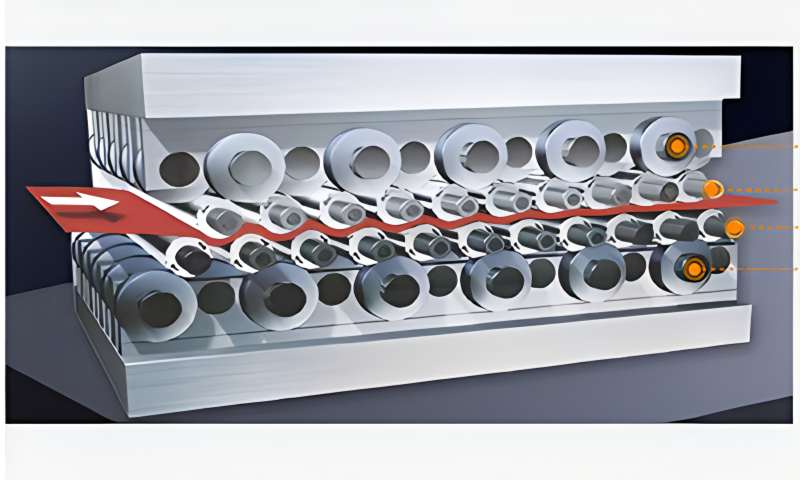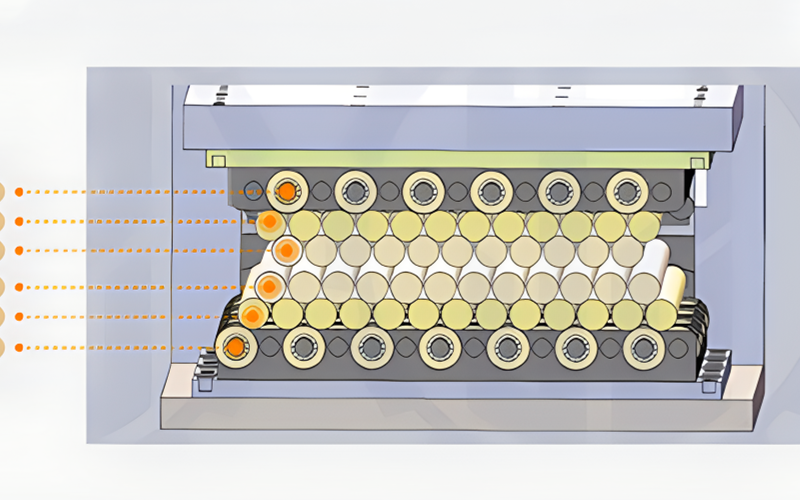High Precision CNC Roller Levelling Machines for Sheet Metal (6-25mm)
CNC Roller Levelling Machines are essential tools in modern metalworking, providing highly accurate leveling and flattening solutions for a wide range of sheet metal and plate materials. These machines are specifically designed for processing materials with thicknesses between 6 mm and 25 mm, including laser-cut, plasma-cut, and punched parts, as well as sheets and plates. They ensure high precision, consistency, and quality across a variety of industrial applications.
The CNC Servo Levelling Machine is engineered to handle the unique challenges posed by thick and heavy materials while delivering exceptional flatness and stress-relief results. With precise adjustments controlled by computer numerical control (CNC), these machines can automatically adapt to the material characteristics, optimizing performance and reducing processing time.

Key Features and Benefits
1. Material Thickness: 6 mm to 25 mm
The CNC Roller Levelling Machine is capable of processing a wide range of sheet metal and plate materials with thicknesses between 6 mm and 25 mm. This range includes materials that are often difficult to handle using traditional leveling methods, such as laser-cut and plasma-cut parts, which can exhibit significant warping due to the heat generated during the cutting process.
For thicker materials (up to 25 mm), the machine applies controlled pressure to achieve flatness without distorting or over-straightening the material.
For thinner materials (starting from 6 mm), the CNC machine uses precise adjustments to ensure a consistent and even level across the entire sheet or plate.
2. Passage Widths Available: 400 mm to 3800 mm
The machine offers a wide variety of passage widths, ranging from 400 mm to 3800 mm, providing flexibility in processing sheets of various sizes. These passage widths make the CNC roller leveler suitable for both small and large metal parts, offering a solution for both high-volume production and custom-sized projects.
Smaller passage widths (400 mm to 1000 mm) are ideal for smaller sheets and parts that need precise leveling in narrow sections.
Larger passage widths (1200 mm to 3800 mm) can handle large plates and heavy materials, which are common in industries such as construction, automotive, and aerospace manufacturing.
3. High Precision CNC Control
The heart of the CNC Roller Levelling Machine is its advanced servo-controlled system, which allows for precise and repeatable adjustments. The CNC control ensures that the leveling process is accurate, minimizing the risk of human error and maximizing consistency in part flatness.
Servo motors control the leveling rollers to apply uniform pressure across the material.
The machine adjusts the roller gap, speed, and pressure based on the material thickness, ensuring that each part is leveled with minimal stress and distortion.
Real-time monitoring and adjustments allow for optimized performance in different materials and conditions.
4. Handling Laser-Cut and Plasma-Cut Parts
Materials that have been laser-cut or plasma-cut are often prone to distortion, due to the heat-affected zones (HAZ) and residual stresses caused during the cutting process. CNC roller leveling machines are designed to correct these distortions quickly and effectively.
The high precision and uniform pressure provided by the CNC system help in flattening plasma-cut or laser-cut parts by removing internal stresses that may cause warping.
The alternating bending process in these machines helps to relieve the residual stresses in the material, ensuring that the parts are perfectly flat and ready for further processing like welding, coating, or assembly.
5. Improved Flatness and Stress Relief
The primary function of the CNC roller leveler is to provide flatness and stress-relief to the metal parts. The leveling machine uses a series of rollers to apply alternating bends, which helps in reducing residual stress that often results from the cutting process. The low-stress process ensures that the material is not overstressed or over-deformed, allowing for better structural integrity.
High flatness achieved by the machine ensures that parts meet strict dimensional tolerance requirements.
The leveling process also eliminates any potential warping or deflection, which could otherwise interfere with post-processing steps like welding, assembly, or coating.
6. Automated and Efficient Operation
One of the key advantages of CNC-controlled leveling machines is their automation. The ability to control all parameters automatically reduces the need for manual adjustments, speeds up the leveling process, and minimizes operator intervention.
The machine can process large quantities of parts in a short time frame, improving production efficiency and reducing costs.
Real-time adjustments to pressure and roller gap ensure that the machine operates at optimal performance throughout the leveling process, regardless of the material characteristics.
Reduced setup times and consistent results allow manufacturers to increase throughput and ensure high-quality products with every cycle.
7. Applications
The CNC Roller Levelling Machine is ideal for use in various industries that require precise flatness and stress-relief for thick plates and sheet metal. Common applications include:
Automotive Manufacturing: For leveling parts used in the production of vehicle bodies, chassis, and other structural components.
Construction and Heavy Equipment: For flattening large metal plates used in the construction of buildings, bridges, machinery, and other infrastructure projects.
Aerospace: For processing parts that require high precision and minimal distortion, ensuring the integrity of aircraft and aerospace components.
Metal Fabrication: For preparing metal sheets and plates for further processing, such as welding, painting, or assembly.
Shipbuilding: For leveling thick steel plates used in the construction of ships and marine vessels.
Heavy Equipment Manufacturing: For flattening plates used in industrial equipment, machinery, and large structural components.
8. Efficiency and Cost Savings
The CNC Roller Leveling Machine offers several advantages that can lead to significant cost savings in the manufacturing process:
Increased processing speed compared to manual leveling methods.
Reduced labor costs due to automation.
High throughput allows manufacturers to process large quantities of parts in a short period of time.
Minimal material waste as the machine ensures that parts are flattened without excessive deformation, reducing the need for rework or scrap.


The CNC Roller Levelling Machine is a powerful and versatile tool for flattening and stress-relieving laser-cut, plasma-cut, and punched metal parts. With its advanced servo-controlled system and high precision, this machine is capable of processing materials with thicknesses ranging from 6 mm to 25 mm and passage widths from 400 mm to 3800 mm. It provides efficient, accurate, and reliable leveling results, making it an essential tool for industries that require high-quality flat metal parts and plates for further processing.
Whether used in the automotive, construction, aerospace, or heavy equipment manufacturing industries, the CNC Roller Levelling Machine ensures that materials are processed quickly, with minimal stress and distortion, while maintaining superior flatness and dimensional accuracy. This technology improves productivity, reduces costs, and ensures that manufacturers can meet the strict quality requirements of modern metalworking applications.
This Metal Leveling Machine with a 120mm roll diameter is designed to provide precision leveling for thicker metal sheets and parts, ensuring flatness and consistency across a wide range of industrial applications.


















